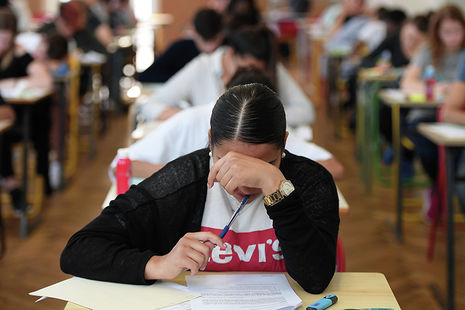Postcode or performance: How the A Level results of 2020 exposed a broken system
Students should not have to pay for mistakes made by a government incapable of understanding what the nation’s pupils need, argues Thea Melton.

For this year’s exam cohort, the lead up to results day on August 13th was especially daunting. Having revealed that 40% of A Level grades were to be downgraded from those initially predicted by teachers, the government triggered a wave of anxiety for students across the country. Conversations about the inequalities of the system soon spread, amid concerns that state school students – particularly those from poorer, ethnic minority communities, would be the hardest hit.
My concerns about the future of my education came into full effect that Thursday morning, when I discovered my grades had been lowered – meaning I had not met my offer to study HSPS. I thought my opportunity to study at Cambridge had slipped out of reach, having been downgraded to a B in Drama, where my offer had required an A* and two A’s. While some of my peers faced much bigger blows, these near miss grades still caused much frustration. Despite being ranked highly in Drama, the algorithm had already decided someone from my state school background was incapable of achieving an A. In short: the algorithm had amplified the racial and class-based inequalities already rife within the British education system, leaving me with an uncertain path to tread.
I soon began to ask: was I being judged on my performance or my postcode? While the media mirrored my concerns, it is important to note that my anxieties were undeniably exacerbated by fear that the grading system had been undermined by bias judgements - conscious or otherwise. As only 5.5% of Black students received 3 A grades or better in the 2018/19 exams, I questioned whether I would be seen as an individual, or as simply another member of this statistic. Fortunately, I had positive relationships with my teachers who tirelessly pushed me to achieve consistent A and A* grades. My school motivated me to apply to Cambridge, despite my reservations about coming from a background not traditionally associated with Oxbridge. Subsequently, although myself a victim of the algorithm, I maintained increased concern for my peers – especially those without the extensive support and encouragement I had been lucky enough to receive.
Statistically speaking, white working class boys and people with Black Caribbean, traveller, Pakistani or Bangladeshi heritage are the highest underachieving groups in education in the UK. As a Black Caribbean woman, it has always been important for me to thrive academically – not only because of my own tenacity, but due to a desire to challenge the negative educational stereotypes associated with this group. The impact personal biases have on the system were exposed in a 2011 survey, which revealed that black applicants were given the lowest predicted grades, with only 39% accuracy, compared to the 53% accuracy of white students. The possibility that racial and class bias may have impacted grades awarded in 2020, therefore should not be dismissed. For students like me, results day revealed quite clearly that grades were not just suffering in the wake of the current pandemic, but at the hands of the education system itself.

Nevertheless, it is evident that it was teachers who were most capable of making informed decisions on the grades which students deserved, having personally overseen their educational progress. The government’s irrational fear that grade inflation could be the worst possible outcome, not only undermined teachers professionally, but dismissed the academic potential of many A level students. Apparent ignorance to the fact that an impersonal algorithm would unfairly disadvantage certain students was a major government failure. It was an impertinent decision for Gavin Williamson not to initially withdraw the algorithm, especially considering the outrage and explicit inequality produced by a similar model in Scotland. In Scotland, students from the most deprived areas saw grades drop by 15.2% compared to the grades of students from more affluent areas dropping by 6.9%. As the government refused to see the fiasco in Scotland as a warning, students in the rest of the UK were left unsettled by the idea that this injustice across the border was just the beginning.
“The government’s irrational fear that grade inflation could be the worst possible outcome, not only undermined teachers professionally, but dismissed the academic potential of many A level students.”
This year, instead of celebrating with friends, many of us spent results day conferring with exams officers and trying to understand how or if we would be able to appeal our grades. Before the government announced it would cover appeal costs, exam boards could charge up to £150 per appeal. The threat of such fees risked financially burdening students – only further aggravating their anxieties. The tough question of if your education was worth economic hardship was faced by many.
Where we had anticipated relief, many of us experienced dread. Despite the grades awarded being completely out of our control, the sense that two years of determination and hard work had gone to waste left many feeling deflated. As a black woman who has always attended state schools, I have grown up with the notion that education would be my way to prove my worth in society. I have been told repeatedly that I would have to work harder than my peers to prove as myself equally intelligent and capable. As the first person from my family and the only person from my school this year to receive a Cambridge offer, my disappointment was amplified. I felt my worth had been dependent on academic excellence, and now I wondered whether people like me were wanted in renowned educational establishments at all.
“Where we had anticipated relief, many of us experienced dread.”
If the education system is not biased, why were state schools penalised where private institutions flourished? This year, independent schools saw the number of A* grades awarded increase by 4.7% compared to only a 2% increase for comprehensive schools. Independent schools were also awarded more than double the amount of A* grades total in comparison to state comprehensive schools. It should be noted, however, that some private school students (including those from Eton) were also downgraded by the algorithm. In fact, the mother of one Etonian told LBC that she knew of a pupil who had been drastically downgraded, from an A* to a D grade in their results.
Moreover, the initial absence of a robust appeals system heightened distress for students – particularly those dependent on amended grades to secure university places. I had been told a successful appeal would be needed imminently to secure my place, if the college where I held an offer (and others in the summer pool) did not accept the grades I had been awarded by the algorithm. My school headteacher warned me that such an appeal result was highly unrealistic, considering schools had no idea how the appeals system would work. Therefore, despite being accepted at Downing College without appeal 24 hours after results day (with the assistance of my school headteacher), a heavy combination of irritation and guilt charred my pleasure in finally confirming my place at Cambridge.
Unfortunately, by the time the government delivered its “U- turn” it was too late for some students who had already accepted alternative university places through Clearing. This algorithm, and delay in scrapping it, has exposed the ineptitude of the Prime Minister and his Cabinet when it comes to education. If we learn one thing from this event, it is that the government has no regard for students – and if you’re poor, an ethnic minority, and state educated, they care even less.
 News / Cambridge academics sign open letter criticising research funding changes22 February 2026
News / Cambridge academics sign open letter criticising research funding changes22 February 2026 News / Supporters protest potential vet school closure22 February 2026
News / Supporters protest potential vet school closure22 February 2026 News / Student and union protesters hold ‘Trans Liberation Solidarity Rally’ 24 February 2026
News / Student and union protesters hold ‘Trans Liberation Solidarity Rally’ 24 February 2026 News / Union speakers condemn ‘hateful’ Katie Hopkins speech14 February 2026
News / Union speakers condemn ‘hateful’ Katie Hopkins speech14 February 2026 News / Hundreds of Cambridge academics demand vote on fate of vet course20 February 2026
News / Hundreds of Cambridge academics demand vote on fate of vet course20 February 2026









